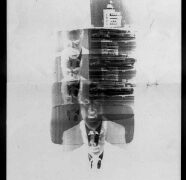Radio Alice was a free radio station in Bologna from 1973-1977. Rathr than attempting to objectify events in the world, they set out to create a flow of sounds, information, messages and poetry, silences and abuse. Like the manifestations of Dada, transmissions were seen as immediate cultural subversions. Bifo, who worked on Radio Alice was interviewed by Carlos Ordonez at the recent conference on Autonomy (’After Marx, April’) in London. The interview was conducted in English. The autonomia movement in Italy during the seventies emerged from the new proletariat of disaffected and unemployed youth, workers and intellectuals creating a radical opposition to institutional politics. ‘Autonomy has no frontiers. It is a way of eluding the imperatives of production, the verticality of institutions, the traps of political representation, the virus of power. In biology an autonomous organism is an element that functions independently of other parts. Political autonomy is the desire to allow differences to deepen at the base without trying to synthesize them from above,to stress similar attitudes without imposing a general line, to all parts to co-exist side and side in their singularity.’ Sylvere Lotringer ‘The Return of Politics’ ‘Autonomia’ issue of Semiotext(e) Q: How did Radio Alice begin, and what experiences did it attempt to address? Radio Alice started in February 1976 with people who came from the experience of Poterio Operia, a leftist revol~tionary group and people involved in the movement of Autonomia. We did not think of Radio Alice only as a political means but, first ofall, as a possibility of organising the experiences of a homogenous community. We were speaking of little groups – feminists, gays, workers. I emphasize this \’little group\’ character because we did not conceive ofthe radio as a political organisation that has to \’state decide\’...

